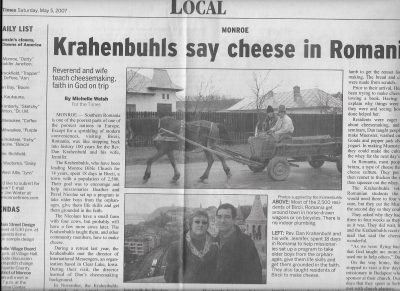Southern Romania is one of the poorer parts of one of the poorer nations in Europe. For Pastor Dan Krahenbuhl and his wife, Jennifer, visiting Bircii, Romania, was like stepping back into history 100 years, except for a sprinkling of modern conveniences.
The Krahenbuhls, who have been leading the Monroe Bible Church for 14 years, spent 18 days on their trip from February 23 through March 12. The goals of their trip were simply to encourage the missionaries and to help them.
The missionaries, Heather and Pavel Nicolae, are in the process of setting up a program where they are taking older boys from the orphanages and giving them life skills and getting them grounded in the faith. They have a small farm with four cows, but will probably have a few more cows later. The Krahenbuhls’ goal was to teach them the life skill of making cheese. Members of the community also came to learn how to make cheese.
Heather, who is from Idaho, was the Krahenbuhls’ interpreter. Pavel is a native of Romania. The couple met while working in a Romanian orphanage. The Krahenbuhls stayed with the Nicolaes, who have three children, ranging in age from one to four.
Preparing for the trip
Last year at a retreat, Dan and Jennifer met the director of International Messengers, an organization which is based in Clear Lake, Iowa. During their visit, the director learned of Dan’s background in making cheese. In November, the Krahenbuhls received an e-mail saying that the people in Romania could use some encouragement and some help making cheese. They felt this was an unusual request so they prayed about whether to go.
After deciding to go, they and their church raised support for the trip. They took $700 worth of supplies to leave with the Nicolaes. Among the supplies were cheese cultures.
“I had no idea what to expect,” Jennifer said. “This was entirely new. It looked to me like a scene out of ‘Fiddler on the Roof’.”
Dan had seen a third world country before, having been to Mexico on a mission trip.
Stepping back in time
In Bircii, people travel in horse drawn wagons or on bicycles. They do things the old fashioned or hard way. There is no indoor plumbing, although communism brought electricity. The people live in small homes with extensions off the house for animals, or sometimes a building might be built a short way from the house. The outbuilding is about the size of a one car garage. In it may live the chickens, two or three pigs, a cow, and a horse. The hay is not baled, but is loose. The corn is in shocks, stacked.
Two men from the Ripon area, a farmer and a field salesman, also traveled with them to Romania. Jennifer went to three farms with the men, who went to look at the farmers’ cows and give them advice and ideas for ways to change or improve the care of their animals.
“The contrast stands out,” Jennifer said. “It was fascinating to see.” She noted that they butchered a lamb or a kid to get the rennet for cheese making. The bread and cheese were all made from scratch.
Yet in the midst of this, occasionally you would see a car. High school students, who went to another town for their education, had cell phones.
Bircii, Romania, has a population of about 2,500 people, though the Krahenbuhls wondered where that number came from as there didn’t seem to be that many people in the community that had one main street with a few dirt side roads.
An immediate impression they received was from watching the body posture of the people. “Some of the first people we saw on the street had their heads down. We could see from their body posture that life was hard, oppressive. People were not typically smiling. They might look up at us and then look down again,” Dan observed.
On the other hand, at church, the people really seemed to know the Bible very well. They were very real and sincere in their faith.
Dan spoke in church on both Sundays and on Thursday when the youth group met. They found it interesting that the men sat on one side and the women on the other. This is done because this is just the way it has always been.
“The believers in church had hope, and the other people didn’t,” he said.
“They sang the same songs! It was amazing,” Jennifer said.
Making cheese
Residents were also eager to learn about cheese making. Dan taught five cheese making seminars. He taught the people how to make Muenster cheese, washed curd brick cheese, Gouda cheese, pepper jack cheese, and yogurt. In making Muenster cheese, they could make the culture from the whey for the next day’s cheese.
In Romania, most make brinza, a type of cheese that has no cheese culture. They put in salt, rennet to thicken the milk, and then they squeeze the whey out. “It doesn’t have much flavor and it is salty.”
The Krahenbuhls told their Romanian students that the cheese would need three to four weeks to cure, but they cut the Muenster on the second day so that they could try it. They asked why they had to wait three to four weeks because they liked it as it was. They did wait, however, and the Krahenbuhls received an e-mail reporting that the cheese was wonderful.
Dan and Jennifer feel that they encouraged Heather to keep trying. Prior to their arrival, Heather had been trying to make cheese by following a book. Having someone explain why things were done as they were and seeing how it was done helped her.
Lessons Learned
“As we were flying back, I felt that God taught me more than He used me to help others,” Dan said. On the way home, the couple stopped to visit a few days with a missionary in Budapest, Hungary, whom they sponsor at their church. During the two days that they spent in Serbia, they met with church planters.
“God used us to be an encouragement in both places,” he continued. “We talked about their struggles and gave them a new possibility on how to deal with something they were struggling with. Having someone from America come over to share faith helped validate their faith. They are part of something bigger, a mighty movement of God. The same God is there as here. The same things being developed in us are being developed in them.”
If they had a chance, they said they’d go again. It was an interesting experience, one that encouraged them as well. God is alive and well, and it is always helpful to see how He works and moves in worlds and cultures so very different, yet very much the same.
By Michelle R. Welsh
Originally published in the Monroe Times, May 5, 2007.
Discover more from Michelle Kaderly Welsh
Subscribe to get the latest posts sent to your email.




No responses yet